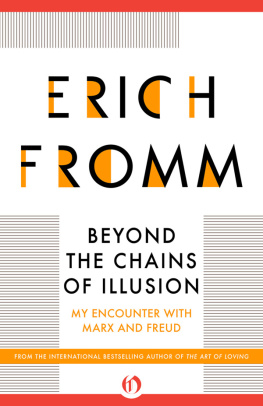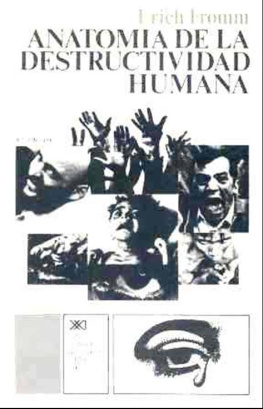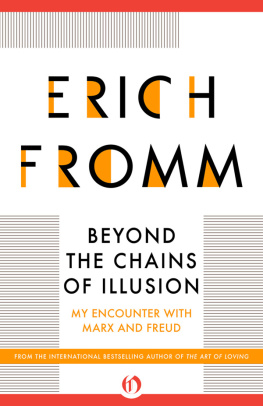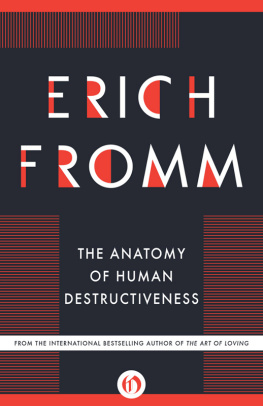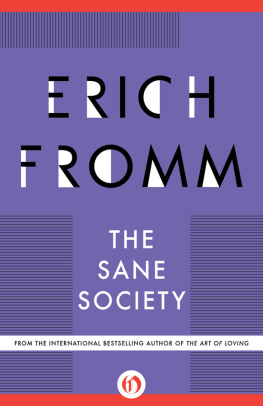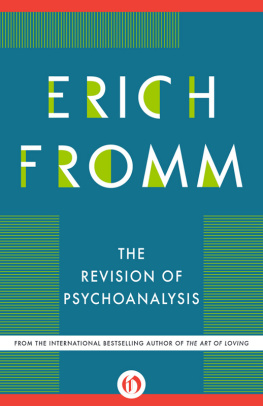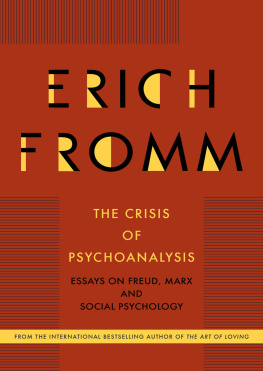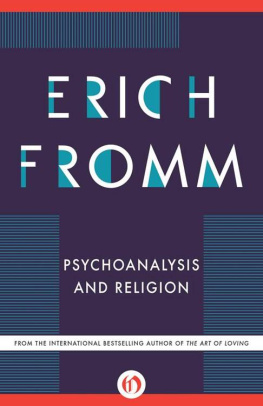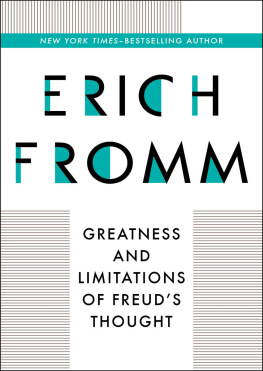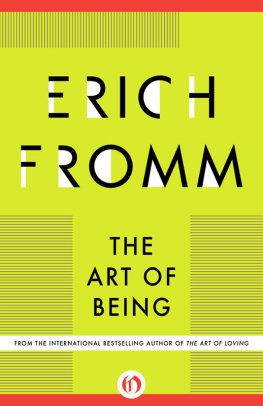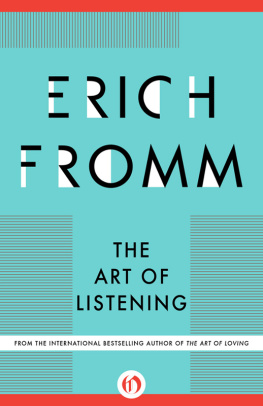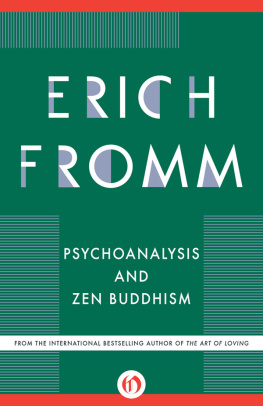I. Freuds Passion for Truth and His Courage
Psychoanalysis, as Freud liked to emphasize himself, was his creation. Its great achievements, as well as its defects, show the imprint of the founders personality. No doubt, then, the origin of psychoanalysis is to be sought in Freuds personality.
What kind of man was he? What were the driving forces in him which made him act, think and feel in the particular way he did? Was he a decadent Viennese, rooted in the sensual and undisciplined atmosphere popularly held to be typically Vienneseas his enemies proposedor was he the great master, in whom no personal shortcoming could be discovered, fearless and uncompromising in his search for truth, loving to his family, kind to his pupils and just to his enemies, without vanity or selfishnessas his most loyal adherents assert? Obviously, neither vilification nor hero worship is of much use to grasp the complex personality of Freud, nor to understand the impact of this personality on the structure of psychoanalysis. The same objectivity which Freud discovered as a necessary premise for the analysis of his patients is indispensable when we try to gain a picture of who he was and what motivated him.
The most striking and probably the strongest emotional force in Freud was his passion for truth and his uncompromising faith in reason; for him reason was the only human capacity which could help to solve the problem of existence or, at least, ameliorate the suffering which is inherent in human life.
Reason, so Freud felt, is the only toolor weaponwe have to make sense of life, to dispense with illusions (of which, in Freuds thought, religious tenets are only one), to become independent of fettering authorities, and thus to establish our own authority. This faith in reason was the basis for his relentless pursuit of the truth, once he had seen a theoretical truth in the complexity and manifoldness of observable phenomena. Even if results, from the standpoint of common sense, seemed to be absurd, this did not disturb Freud. On the contrary, the laughing mob, whose thinking was determined by the wish for convenience and an undisturbed sleep, only accentuated the difference between conviction and opinion, reason and common sense, truth and rationalization.
In this faith in the power of reason, Freud was a child of the age of enlightenment. Its motto: Sapere audeDare to knowis stamped over all of Freuds personality and all of his work. It was a faith originally engendered in the emancipation of the Western middle class from the bonds and superstitions of feudal society. Spinoza and Kant, Rousseau and Voltaire, different as their philosophies were, all shared this passionate faith in reason; they all felt the common bond of fighting for a new, truly enlightened, free and human world. This spirit continued to exist in the nineteenth-century middle class of Western and Central Europe, and especially among the students devoted to the progress of the natural sciences. Freuds Jewish background, if anything, added to his embrace of the enlightenment spirit. The Jewish tradition itself was one of reason and of intellectual discipline, and, besides that, a somewhat despised minority had a strong emotional interest to defeat the powers of darkness, of irrationality, of superstition, which blocked the road to its own emancipation and progress.
In addition to this general trend in the European intelligentsia of the late nineteenth century, there were specific circumstances in Freuds life which probably increased his tendency to rely on reasonand not on public opinion.
Quite in contrast to all great Western powers, the Austro-Hungarian monarchy was, in Freuds lifetime, a decaying body. It had no future, and the power of inertia, more than anything else, held the various parts of the monarchy together, in spite of the fact that her national minorities were frantically striving for independence. This state of political decay and dissolution was apt to awaken an intelligent boys suspiciousness, and to arouse his questioning mind. The discrepancy between the official ideology and the facts of the political reality was apt to weaken anyones confidence in the reality of words, slogans, authoritative statements, and was prone to foster the development of a critical mind. In Freuds special case, another element of insecurity must have furthered the same development. His father, a prosperous small manufacturer in Freiberg (Bohemia), had to give up his business as a result of the changes in the whole Austrian economy, which hit and impoverished Freiberg. Freud as a young boy learned by drastic experience that social stability was to be as little trusted as political stability; that no tradition or conventional setup offered any security or deserved confidence. For an extraordinarily gifted boy, where would these experiences lead him, but to put all his faith in himself, and in reason, as the only weapon he could dare to trust.
Yet there were many other boys growing up under the same circumstances, and they did not become Freuds; neither did they develop an extraordinary passion for truth. There must have been elements in Freuds personality, peculiar to himself, which were responsible for the extraordinary intensity of this quality.
What were they?
Undoubtedly we must first think of an intellectual endowment and a vitality, far above the average, which were part of Freuds constitution. This unusual intellectual gift, combined with the climate of the enlightenment philosophy, the shattering of the usual trust in words and ideologiesall this alone might be sufficient to explain Freuds reliance on reason. There may be other purely personal factors, as, for instance, Freuds wish for prominence, which could have led to the reliance on reason, since no other power, be it money, social prestige or physical force, was at his disposal. If we look for still more personal elements in Freuds character which may account for his passion for truth, we must point to a negative element in his character, his lack of emotional warmth, closeness, love, and beyond that, of enjoyment of life. This may sound like a surprising statement to be made about the discoverer of the pleasure principle, and the alleged protagonist of sexual pleasure, yet the facts speak with a loud enough voice so as not to leave any doubt. While I shall come back later to present some evidence for these statements, suffice it to say here that given his gifts, given the cultural climate, given the special European, Austrian and Jewish elements in his environment, a boy with his wish for fame and recognition and his lack of joy in life had to turn to the adventure in knowledge if he wanted to fulfill his lifes desire. There may be still other personal elements which account for this side of Freud. He was a very insecure person, easily feeling threatened, persecuted, betrayed, and hence, as one would expect, with a great desire for certainty. To him, considering his whole personality, there was no certainty in lovethere was only certainty in knowledge, and he had to conquer the world intellectually if he wanted to be relieved of doubt and the feeling of failure.



